Abrea Armstrong (MSM ’16), a Winston-Salem native, “roots for everyone and everything Black.”
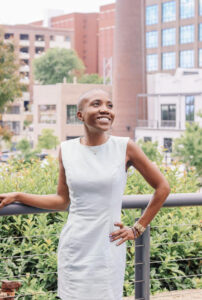
Abrea Armstrong in downtown Winston-Salem; photo courtesy of Armstrong. Above, Armstrong reads to Freedom School students; photo by Ken Bennett. Other photos and images courtesy of Triad Cultural Arts Inc.
When she was recruited late last year to lead Triad Cultural Arts Inc., a local nonprofit group working to preserve and share local Black history and culture, it was the perfect fit. As executive director, Armstrong, 32, gets to draw on her experience hustling as a hip-hop journalist in New York City, the management skills she studied at the Graduate School of Business and the lessons she learned on the ground in marketing and communications for Winston-Salem’s Innovation Quarter during the COVID-19 pandemic.
Now, she’s in charge of programs and events ranging from a weekend-long Juneteenth festival and online exhibits on school desegregation to walking tours and fundraising for the restoration of historic buildings.
Managing Editor Kelly Greene (’91) of Wake Forest Magazine caught up with Armstrong while she was working from home (in her high-rise downtown apartment) to talk about her vision for the organization and how her time at Wake Forest continues to help her today. Here are excerpts from their conversation, edited for length and clarity.
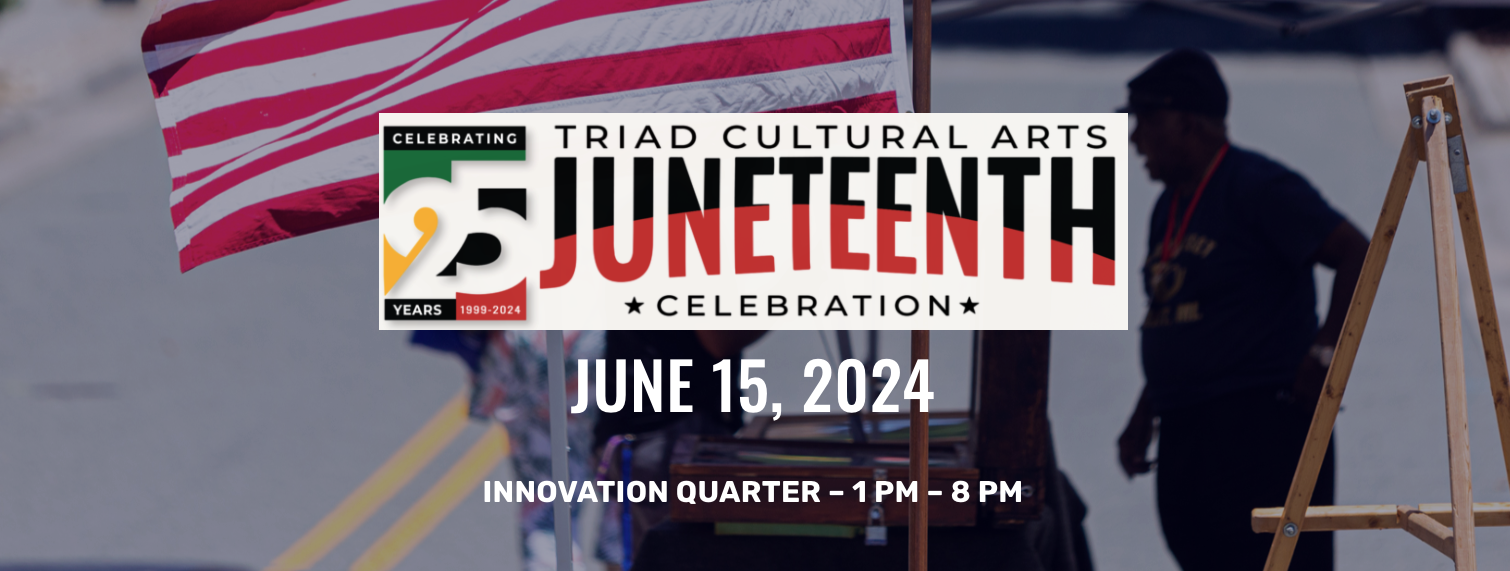
Kelly Greene: You grew up in Winston-Salem and are such a fan that you have a camel tattoo on your arm, right? Have you always been a Wake Forest fan as well?
Abrea Armstrong (holding up her arm and laughing): Yes, it’s a Picasso line drawing — a very Millennial downtown-y thing to do. And oh, my goodness, so many memories. My father (Prentice Armstrong P ’10, ’16) has worked at Wake longer than I’ve been alive. He’s an accountant in the library, and my sister (Jessica Armstrong ’10) went there for her undergraduate degree. I remember one year when it snowed, and Dad brought us to campus. I had this doll with roller skates I was trying to get to go across the sidewalk that connects the two sides of the Quad. And I remember going to basketball games in the Chris Paul (’07) days. I went to Salem Academy and then to St. John’s (University in Queens, N.Y.). My parents recognized that I had a vision for myself, and they found ways to support that.
KG: And once you got to New York, you stayed for a few years as a freelance journalist. How did you make your way back to Wake Forest?
AA: Yes, it was cute and fun when I was 21 and 22, but then, I thought, I need a career. If bringing people together, convening, communicating, marketing, is my thing, especially centered in things that move Black Americans forward, how do I apply that in ways that allow me to also live abundantly in the same way that I’m giving abundantly to my community?
So, I started looking at business schools, and when Wake offered me a fellowship … there was some parental pressure in a healthy way. The Black cohort (I was with) at the School of Business is the most exceptional group of people that I know. I’m just grateful to the admissions team for bringing us all together and recognizing that there was this group of kids, whether it was from Howard or St. John’s or FAMU or Duke or wherever, that they brought together to teach things we didn’t know about. Getting that degree was one of the top three best decisions I’ve ever made.
I do also have to say that groups like PwC or Deloitte would come in and have informational sessions, and I never went to one. I was like, “I don’t want to have to wear a suit every day. I want to be in a creative industry.”
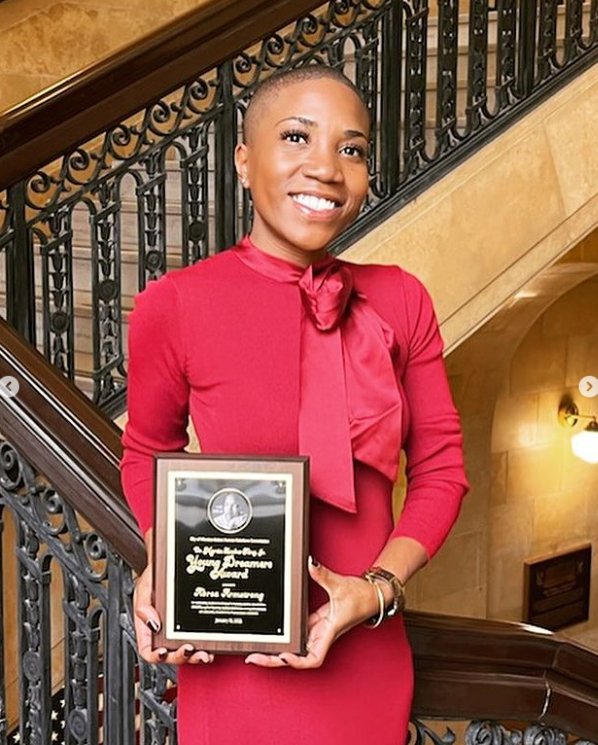
Armstrong won Winston-Salem's 2022 Martin Luther King Jr. Young Dreamers Award.
KG: How did that go?
AA: I was interviewing in (New York City) with ad agencies, where they were paying you $25,000 a year. And I remember having a conversation with myself again where I said, “I could be a small fish in a big pond, or I could be a medium fish in a small pond.”
(Armstrong chose the small pond, first working as a social media copywriter for a Greensboro, North Carolina, agency for 18 months, and as marketing and communications coordinator for the Innovation Quarter in downtown Winston-Salem for three years, including the summer of 2020, when protesters occupied the district’s Bailey Park. In 2021, she left to become director of communications for Activest, a Black-owned investment research firm that works toward “fiscal justice” by analyzing municipal spending and sharing its impact on Black residents with bondholders to encourage them to push for change.)
(Activest) laid me off in January 2023, which was super surprising, and I just took the year. I already had a marketing business that I started during the pandemic, when I was stuck at home, and I’m so glad I did. In October, I got a call from Carol Davis (JD ’94), who is the interim board chair for Triad Cultural Arts. She had already reached out to me as the head of the Simon G. Atkins (Community Development Corp.) to help with their marketing, writing, press releases. She asked me if I would be interested in this opportunity, and I said, “Sure, let’s talk.” … I’m grateful to be in this seat, to bring it all together. And I know that God has given me the skills and talents and life experience to perfectly prepare me for this.
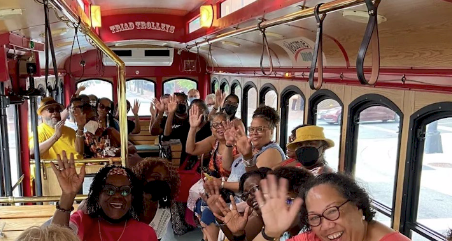
A Triad Cultural Arts trolley tour
KG: We hear so much about imposter syndrome among professional women — and how self-doubt can stop them from taking risks. But you exude confidence. What’s your secret?
AA: If I feel like I belong in the room, then automatically imposter syndrome disappears. And yes, I recognize that there are external factors that can make a person feel more — or less — welcome, but there’s also a strong sense of personal agency in that. And so, I just never allow myself to feel it. I also recognize when I don’t know (the answer, and) I am not afraid to say that I don’t. I think that’s also very powerful. And I think that comes from being a journalist wanting more information — or being curious. It’s about finding that balance of moving with a certain amount of confidence but grounding it in fact.
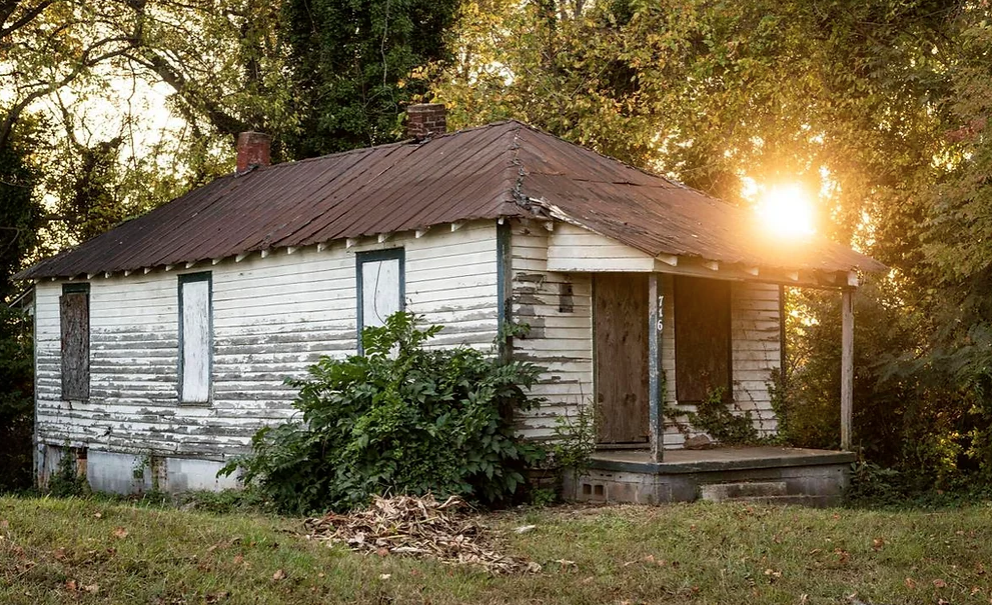
The shotgun house that Triad Cultural Arts is restoring
KG: Tell us more about Triad Cultural Arts.
AA: If there’s something in relation to Black history or Black culture that you want to do or know (in Forsyth County, North Carolina), we want to be the first people you think of. It’s everything from programming, for Kwanzaa, the Juneteenth Festival — this is its 25th anniversary, and Triad Cultural Arts grew out of it — and also things like our customized Black history tours, whether it’s a walking tour downtown or an art and mural tour.
We help remind people of the things that their memory has forgotten — including structural or architectural memory. So, Triad Cultural Arts right now is rehabbing a 100-year-old shotgun house in Happy Hill, which is Winston-Salem’s first planned African American community. We have to be intentional about preserving things in the same way that Old Salem has been preserved. It’s really exciting to be able to use it as a living museum. We’ve been collecting a lot of history through our community listening sessions, and now we’re curating that content and turning it into an exhibition that people can come visit.
We’re leaning into the spiritual aspect of it and painting it blue. Shotgun houses originated in West Africa, and they were painted blue to distract evil spirits, so they run away. Painting it blue is a nod to say that even though this house stands here alone on a hill in Winston-Salem, it’s part of the Black diasporic narrative.
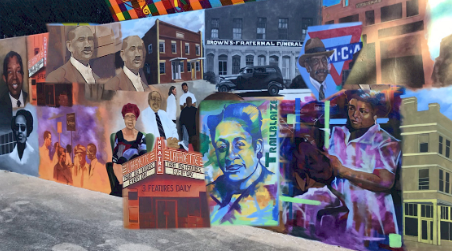
Depot Street Renaissance mural
KG: Are you connecting Wake Forest students into what you’re doing? And for alumni in town for a football weekend, how can they engage with Triad Cultural Arts?
A group of students working on a documentary that involves Old Salem reached out to us. And I’m going to be opening our internship to Wake Forest students. We had a graphic design intern this semester from (North Carolina A&T State University), but certainly we’re going to be advertising internship opportunities for fall.
(For a weekend) here’s what I would suggest: Visit the Depot Street Renaissance mural in the Innovation Quarter. TCA worked with artist Leo Rucker to tell the history of the people featured on the 20-foot-long wall. You can then walk around the Innovation Quarter and understand the Black history of the land around you.
KG: Abrea, thank you so much for your time today as you finish getting ready for Juneteenth. How have you influenced this year’s festival?
AA: Thank you! My fiancé is from Ghana, so I go back and forth a lot, and there are certain foods I’ve had there where I feel the cultural memory — coleslaw, things like okra, the love of onions. Culture realizes itself in various ways and various mediums, so we decided we had to talk about food. That’s why there’s going to be a Juneteenth brunch at Sweet Potatoes that people should really come to.
I recognize that, for our community to move forward holistically, we have to learn about each other.


